
The finalists for WashingtonExec’s Pinnacle Awards were announced Oct. 13, and we’ll be highlighting some of them until the event takes place virtually Dec. 8.
Next is Supply Chain Executive of the Year finalist Mike Beck, project director of the Antarctic Support Contract at Leidos. Here, he talks what has made him successful, what he has learned from failure, proud career moments and more.
What has made you successful in your current role?
Our people and partnerships. We are blessed with so many talented individuals that have dedicated their entire careers to enabling the mission for the U.S. Antarctic Program and the science community at large through their service on the Antarctic Support Contract.
Many have been through multiple M&O contractors and a continuing flow of new seasonal staff. They continue to patiently teach, share their book of knowledge and grind through the tough challenges Antarctica and the supply chain can present. They are incredibly resilient and committed in their drive to deliver.
Most of them have continued with us and pressed through COVID-19 challenges that necessitated great personal sacrifice to meet the stringent deployment requirements, including extended isolations, all aimed at keeping COVID-19 off the ice and our participants safe.
Outside of ASC, there is a broader partnership of stakeholders working through careful coordination by the customer to drive success across the mission. ASC receives excellent support from the leadership team in the National Science Foundation, the U.S. Air Force, New York Air National Guard, Military Sealift Command, NIWC, and a host of subcontractors to both NSF and the ASC.
What’s one key thing you learned from a failure you had?
Bad news doesn’t get better with age. Maintaining a great deal of transparency and timely, clear communications with the customer and our team is incredibly important. Doing so enables us to strengthen our bond and build a high level of trust, paving the way for improved accountability and performance.
Ultimately, it enables an environment where emotions are removed (well, most of them anyway) from the situation and allows for a fact-based collaboration in delivering effective corrective action plans and expanded learning across the team.
Which rules do you think you should break more as a government/industry leader?
The curfew my wife sets for me in leaving work.
Looking back at your career, what are you most proud of?
Service to the nation across many mission spaces and customer domains. I started my college education at the United States Military Academy with every intention of becoming a career Army officer. I never could really squelch my passion for pursuing aerospace engineering, though, and I made a very difficult decision to leave USMA and continue at Texas A&M University, where I earned both B.S. and M.S. degrees in aero.
I have been very fortunate to be able to apply my degrees across many challenges, initially in support of the Department of Defense, as well as various space customers, the Department of Energy and now in support of incredibly interesting and crucial research through service to the NSF and its grantees. I found a different way to serve.
What’s your best career advice for those who want to follow in your footsteps?
Be prepared, unwavering and boldly confident when the opportunity presents itself… step up! Looking back, I would have never guessed my career progression. Some of my greatest opportunities were completely unexpected and certainly not a part of my bigger plan. Others came to me through a series of small incremental changes. Each brought unique challenges, tools and experiences that I could leverage going forward.
While super challenging, this job has allowed me to see and experience things only a small percentage of humankind can partake in (like standing at the South Pole . . . how cool is that?). Seek out many mentors and add a dash of luck, and you, too, will have an incredible journey.

